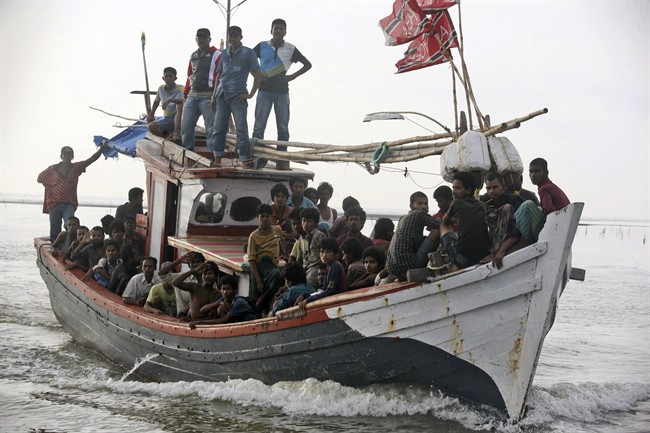Would dodging ISIS gunfire and retracing the steps of the millions of people who flee their war-torn home countries help you better understand the plight of asylum seekers and refugees?

That’s the apparent mission of the Australian documentary series Go Back To Where You Came From, which sent a group of participants with opposing views to Syria, Iraq, Thailand and Indonesia in a bid to show them “the world through the eyes of refugees.”
The worldwide numbers of refugees and people displaced by conflict is the highest on record — more than 59.5 million people worldwide in 2014, according to the United Nations High Commission for Refugees.
But Australia has maintained a widely criticized policy of turning away boats and shipping those that do make it ashore to overcrowded and squalid detention centres, in places like Papua New Guinea and the island nation of Nauru.
READ MORE: Malaysia launches talks on Southeast Asia’s deepening migrant crisis
Australian broadcaster SBS said there is no time like the present to bring the series back for another season; seasons one and two aired in 2011 and 2013 respectively.
“The refugee and asylum seeker debate is one of the most complex and divisive for our modern multicultural Australian society,” SBS managing director Michael Ebeid told the Sydney Morning Herald. “And the time is right to continue the conversation now.”
Cast members in the new season of Go Back To Where You Came From were also taken out on the open sea in an attempt to reach the Australian coast by boat, only to be turned away; journeyed to one of the Australia’s detention centres; got a firsthand look at the conditions in a Jordanian refugee camp; and spent time with a family of refugees now living in Australia.
Bringing people face-to-face with these issues and the people affected by them is something Amnesty International Canada’s Gloria Nafziger said would certainly “hit home for people.”
Preconceptions about refugees and asylum seekers is something that has divided Australian society. But similar prejudices exist in Canada as well, according to Nafziger.
“People who enter into this debate are entering into it with absolutely no facts at all, but a whole lot of stereotypes, images and messages that have been given to them,” she said. “I think the reality is the vast majority of us have absolutely no idea what the conditions are like that refugees are forced to flee from.”
READ MORE: Dear migrant crisis: You’re ruining our vacations. Love, British tourists
In the third season of the award-winning series, which debuted on Australian broadcaster SBS Tuesday evening, the scenario got about as real as reality TV gets — when three of the show’s participants had to scurry to safety as ISIS militants fired mortars in the direction of the abandoned school they were filming at last October.
“We were told to listen for any whistling sounds coming through the air and that would mean a mortar had been fired. We were told we had 30 seconds to run 100 metres,” Kim Vuga, an anti-asylum seeker activist who runs the Facebook group Stop the Boats, told the Sydney Morning Herald. “It was crazy to actually see a black flag in place.”
READ MORE: Dinghies and shoddy wooden boats — How smugglers ship migrants to Europe
While the show has drawn some criticism for putting participants’ lives at risk, the close encounter appears to have done little to change the heart and mind of Vuga — who has since that time continued her support for the Australian government’s policy for asylum seekers trying to reach Australia by boat (often referred to as boat people).
She suggested the “learning experience” only reaffirmed her belief that asylum seekers could post a threat to national security.
“Australia should be helping Christian refugees who will fit into our culture with minimal problems. Saudi Arabia is wealthy, they can afford to help the Muslims who are in need of protection and assistance. Where is it written that the west must be the milking cow for the world?” Vuga said in a separate interview with News.com.au.
Although she is likely the most polarizing of the cast members, Vuga is but one of six people in this season’s cast — a mix of those opposed to Australia’s treatment of asylum seekers and those who stand by the government’s protectionist policies.
Those sharing a somewhat similar view to Vuga include Melbourne-area teacher Andrew Jackson, who said he softened his position on boat people as a result of filming the show; Vietnamese-born Australian Davy Nguyen, a former boat person himself who sympathized with the government’s closed-door policy; and government policy supporter Jodi Marner, whose asylum seeker advocate sister Renee also appears in the show.
Rounding out the cast is Nicole Judge, who not only worked at detention centres in Nauru and on Papua New Guinea’s Manus Island but became a whistleblower about the conditions detainees are forced to endure while being held.
The third season of the award-winning series debuted Tuesday night and airs for three consecutive nights.
CORRECTION: An earlier version of this story incorrectly stated the participants of Go Back To Where You Came From travelled to Myanmar.




Comments